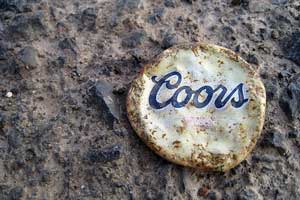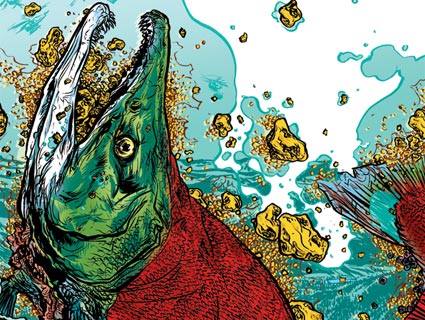The battle over the fate of the Bristol Bay watershed in southwestern Alaska—one of the most abundant sources of salmon in the world, a boon to local native towns, and home to some of the largest untapped gold mines in the country—staggers on. In its waning days, the Bush administration submitted a plan to open up a million acres of the region to mining projects and oil and gas leasing. But in the latest development, a cadre of sportsmen and conservation groups are petitioning the Obama administration to ban those operations. They recently sent a letter to Interior Secretary Ken Salazar expressing fear that the projects could damage the local fishing industry and leech the harmful, toxic kind of waste generated by industrial mines into the surrounding ecosystems. “We look forward to working with the BLM as we move quickly to reverse the wrong-headed decisions that were made in the closing months of the last administration and implement a common sense plan for fish and wildlife in Bristol Bay,” the letter says, the AP reported.
This tussle over the fate of Bristol Bay isn’t new. Indeed, one of the most incisive and vivid accounts of a similar struggle over the Pebble Mine, near the BLM’s proposed mining area, appeared here in 2006, in a piece titled “The Midas Touch” by Kenneth Miller. Miller traveled to isolated Igiugig, Alaska to see the forces and characters at play (like fisherman, lodge owner, and former pro hockey player Brian Kraft) in this saga. He described their problem like this:
Kraft’s attachment to this stretch of clear, swift water goes deeper than the bottom line. “This river is a powerful living thing,” he tells me, a note of awe softening his usually blunt delivery. “It’s alive, and it’s carrying life. It’s in my blood.” It is also, he says, under mortal threat. At the north end of Iliamna Lake, a company called Northern Dynasty Mines aims to unearth what may be the largest gold deposit—and the second-largest copper deposit—in North America. The proposed Pebble Mine complex would cover some 14 square miles. It would require the construction of a deepwater shipping port in Cook Inlet, 95 miles to the east, and an industrial road—skirting Lake Clark National Park and Preserve and traversing countless salmon-spawning streams—to reach the new harbor. At the site’s heart would be an open pit measuring two miles long, a mile and a half wide, and 1,700 feet deep. Over its 30- to 40-year lifetime, the Pebble pit is projected to produce more than 42.1 million ounces of gold, 24.7 billion pounds of copper, 1.3 billion pounds of molybdenum—and 3 billion tons of waste.
More than three years later, it remains to be seen whether the Pebble Mine or the larger mining area under review by the BLM will get the green light or not. The latter decision, a Bureau of Land Management spokeswoman told the Anchorage Daily News, rests in Salazar’s hands now. As Miller points out, the consequences of allowing more industrial mining into Bristol Bay could be disastrous not just to the environment, but to life as those who live there know it. Here’s hoping Salazar is bearing that in mind.
















